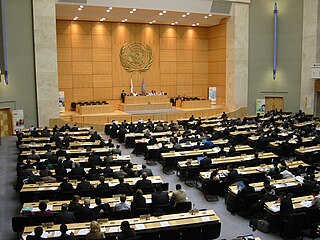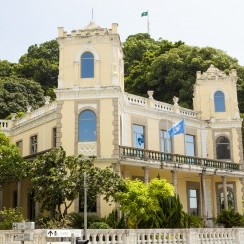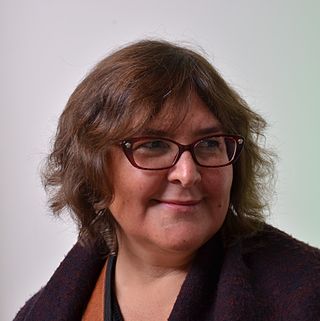Communities of Expertise
Communities of Expertise (CoEs) are networks convened by GAID to bring together motivated and capable actors to address specific, well-defined ICTD problems in a results-oriented manner and to identify and disseminate good practices. These CoEs include:
Education, Entrepreneurship, Governance, Health
Cross cutting themes include gender, rural development and connectivity.
In October 2006, under the CoE of Governance, the ICT4Peace Foundation was invited to a partnership with the UN Department of Economic and Social Affairs (DESA) and GAID as the focal point for overseeing and promoting the spirit of Paragraph 36 of the WSIS Tunis Declaration. Paragraph 36 flags the potential for the use of ICTs to promote peace and to prevent conflict which, inter alia, negatively affects achieving development goals. On 13 January 2010 the ICT4Peace Foundation created the ICT4Peace Foundation wiki on Haiti Earthquake.

The World Summit on the Information Society (WSIS) was a two-phase United Nations-sponsored summit on information, communication and, in broad terms, the information society that took place in 2003 in Geneva and in 2005 in Tunis. WSIS Forums have taken place periodically since then. One of the Summit's chief aims is to bridge the global digital divide separating rich countries from poor countries by increasing internet accessibility in the developing world. The conferences established 17 May as World Information Society Day.
The Association for Progressive Communications (APC) is an international network of organizations that was founded in 1990 to provide communication infrastructure, including Internet-based applications, to groups and individuals who work for peace, human rights, protection of the environment, and sustainability. Pioneering the use of ICTs for civil society, especially in developing countries, APC were often the first providers of Internet in their member countries.

The United Nations Information and Communication Technologies Task Force was a multi-stakeholder initiative associated with the United Nations which is "intended to lend a truly global dimension to the multitude of efforts to bridge the global digital divide, foster digital opportunity and thus firmly put ICT at the service of development for all".
Technology governance means the governance, i.e., the steering between the different sectors—state, business, and NGOs—of the development of technology. It is the idea of governance within technology and its use, as well as the practices behind them. The concept is based on the notion of innovation and of techno-economic paradigm shifts according to the theories by scholars such as Joseph A. Schumpeter, Christopher Freeman, and Carlota Perez.

Information and communications technology (ICT) is an extensional term for information technology (IT) that stresses the role of unified communications and the integration of telecommunications and computers, as well as necessary enterprise software, middleware, storage and audiovisual, that enable users to access, store, transmit, understand and manipulate information.
Andrey Korotkov was First Deputy Communications and Informatisation Minister in Russia (2002–2004) and Senior Vice President and CIO of Bank VTB (2004–2006).

The United Nations University Institute in Macau, formerly the United Nations University International Institute for Software Technology and then United Nations University Institute on Computing and Society, is a United Nations University global think tank conducting research and training on digital technologies for sustainable development, encouraging data-driven and evidence-based actions and policies to achieve the Sustainable Development Goals. UNU-Macau is located in Macau, China.

The Internet Governance Forum (IGF) is a multistakeholder governance group for policy dialogue on issues of Internet governance. It brings together all stakeholders in the Internet governance debate, whether they represent governments, the private sector or civil society, including the technical and academic community, on an equal basis and through an open and inclusive process. The establishment of the IGF was formally announced by the United Nations Secretary-General in July 2006. It was first convened in October–November 2006 and has held an annual meeting since then.

Talal Abu-Ghazaleh is the chairman and founder of the international Jordan-based organisation, the Talal Abu-Ghazaleh Organization (TAG-Org). Dubbed as the godfather of Arab accounting, Abu-Ghazaleh has also been credited for promoting the significance of Intellectual Property in the Arab World.
Information and communication technology in agriculture, also known as e-agriculture, is a subset of agricultural technology focused on improved information and communication processes. More specifically, e-agriculture involves the conceptualization, design, development, evaluation and application of innovative ways to use information and communication technologies (ICTs) in the rural domain, with a primary focus on agriculture. ICT includes devices, networks, mobiles, services and applications; these range from innovative Internet-era technologies and sensors to other pre-existing aids such as fixed telephones, televisions, radios and satellites. Provisions of standards, norms, methodologies, and tools as well as development of individual and institutional capacities, and policy support are all key components of e-agriculture.
The African Telecommunications Union (ATU) is an organization in Africa that combines countries and mobile telecommunications providers in an attempt to dramatically increase development of the continent's information and communication technology (ICT) infrastructure.
E-Government in South Korea progressed notably with the establishment of the National Computerization Agency (NCA) in 1986, and was further developed under President Kim Dae-jung's administration with the creation of the Presidential Special Committee for e-Government (SCeG) in 2001. The passage of the Electronic Government Act of 2001 provided the essential legal framework, facilitating the advancement of e-government initiatives.

Kamran Elahian is an Iranian-American entrepreneur who is the chairman and founder of Global Innovation Catalyst and advises various governments on the needed transition from fossil-based economies to sustainable innovation economies. In the past, as a global high-tech entrepreneur, he co- founded ten companies, had 6 exits, 3 of them were Unicorn IPOs with a total market cap of over $8B. For 15 years he was Chairman of Global Catalyst Partners, a global VC firm with investments in the U.S., Japan, China, India, Israel and Singapore. Underlying his vision for global philanthropy is the conviction that modern Information and Communication Technologies (ICT) can be instrumental in dissolving barriers between nations and bridging the social and political differences among people. This vision was reflected in Schools-Online, a nonprofit he co-founded in 1996 to connect the world, one school at a time and merged with Relief International in 2003; Global Catalyst Foundation, co-founded in 2000 to improve lives through effective education and empowerment of the youth using the leverage of ICT, and UN-GAID, a United Nations global forum that promotes ICT in developing countries where he served as Co-Chairman (2009-2011).

Quinn Sutton is an American business professional. He is the Executive Director of the Digital Alliance Foundation and is known for his work in the private technology education sector and his work on a variety of UN-related and humanitarian projects. In 2007, he co-founded the Digital Alliance Foundation which provides capacity-building Information and Communications Technologies (ICT) skills to marginalized populations and serves as a High-Level Advisor for the Global Alliance for Information and Communication Technologies and Development (UNGAID).
ICT4peace is a policy and capacity-building oriented international foundation. The purpose is to save lives and protect human dignity through Information and Communication Technology (ICT). The Foundation promotes cybersecurity and a peaceful cyberspace through international negotiations with governments, companies and non-state actors. It also explores and champions the use ICTs to facilitate communication between peoples, communities and stakeholders involved in humanitarian or conflict-related crisis management and crisis mapping, humanitarian assistance and peacebuilding. It is registered as ICT for Peace in the Geneva business directory.

Anriette Esterhuysen is a human rights defender and computer networking pioneer from South Africa. She has pioneered the use of Internet and Communications Technologies (ICTs) to promote social justice in South Africa and throughout the world, focusing on affordable Internet access. She was the executive director of the Association for Progressive Communications from 2000 until April 2017, when she became APC's Director of Policy and Strategy. In November 2019 United Nations Secretary-General António Guterres appointed Esterhuysen to chair the Internet Governance Forum’s Multistakeholder Advisory Group.
Science and technology in Tanzania describes developments and trends in higher education, science, technology, innovation policy, and governance in the United Republic of Tanzania since the turn of the century.

The Observatory on Digital Communication (OCCAM) was established in 1996 by UNESCO in Milan, with the Agreements signed by the Director General, Federico Mayor and Marco Formentini in June 1996. The acronym stands for Observatory for Cultural Communication and Audiovisual in the Mediterranean.
The African Internet Governance Forum (AfIGF) is a multistakeholder forum that facilitates dialogue on Internet governance issues. It is one of the 19 regional IGF initiatives and aims to address and discuss the issues of all 54 nations in Africa.









